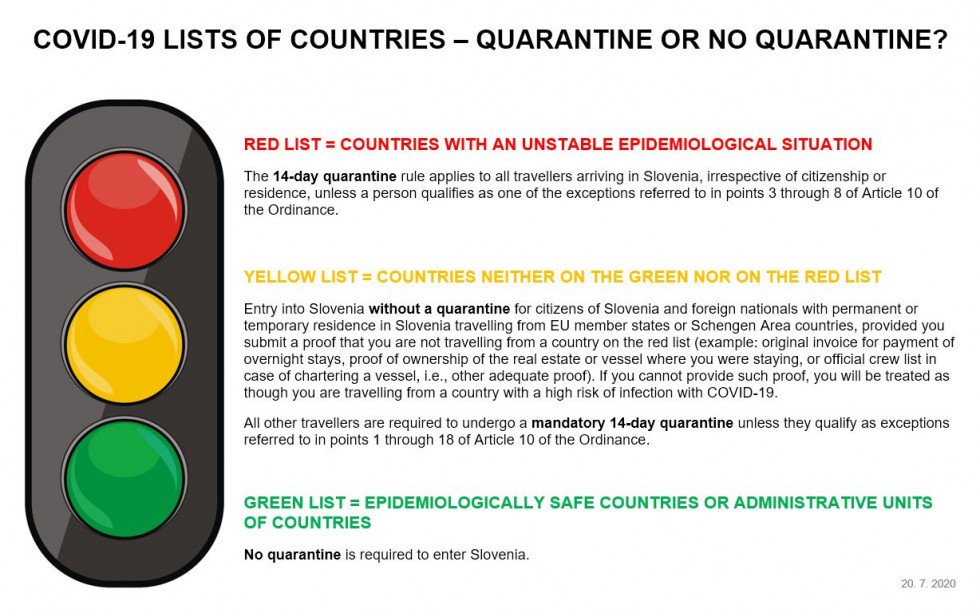Crossing the state border during the coronavirus epidemic
Slovenia declared an epidemic on 12 March 2020 due to the growing number of coronavirus infections. In order to contain the spread of infection, many countries, including Slovenia, introduced changes in their border crossing regime. The Government of the Republic of Slovenia adopted an ordinance declaring the end of COVID-19 epidemic effective from 15 May. But since the risk of spreading COVID-19 still persists, the general and specific measures adopted pursuant to the decision on the application of measures under the Communicable Diseases Act will continue to apply.
In this context, certain (temporary) restrictions of traffic are still valid not only on the border with Croatia, but also on the internal Schengen borders (with Italy, Austria and Hungary), where border controls were abolished back in 2007 after Slovenia joined the Schengen area. A few entry and exit requirements have also been changed for foreign nationals and Slovenian citizens.
COVID-19 Lists of countries
Arriving from countries on the green list
No quarantine is required for travellers who enter Slovenia and have a permanent or temporary residence in a country which is on the list of epidemiologically safe countries (green list) and are coming from those countries.
Arriving from the states on the yellow list (countries neither on the green nor on the red list)
Slovenian citizens irrespective of their residence or foreign nationals with a permanent or temporary residence in Slovenia travelling from a country on the yellow list (if the country is a EU member state or a Schengen Area country) may enter Slovenia without a quarantine if they submit a proof that they are not travelling from a country on the red list (example: original invoice for payment of overnight stays, proof of ownership of the real estate or vessel where they were staying, or official crew list in case of chartering a vessel, i.e., other adequate proof).
All other travellers are required to undergo a mandatory 14-day quarantine.*
* By way of exception, they can enter Slovenia without restrictions or having to quarantine if they qualify as exceptions referred to in points 1 through 18 of Article 10 of the Ordinance. However, travellers entering Slovenia as exceptions under points 2, 3, 8, 9, 10, 11, 12, 13, 14, 16, and 17 also have to show a negative test for Covid-19 that is not older than 36 hours and must be taken in an EU/Schengen Area member state.
Arriving from countries on the red list
The 14-day quarantine rule applies to all travellers arriving in Slovenia from countries with an unstable epidemiological situation (red list), and travellers with a temporary or permanent residence in these countries entering Slovenia (irrespective of their citizenship or residence).*
Countries on the red list (as of 17 July 2020): Qatar, Bahrain, Chile, Kuwait, Peru, Armenia, Djibouti, Oman, Brazil, Panama, Belarus, Singapore, Sweden, Maldives, São Tomé and Príncipe, United Arab Emirates, United States of America, Saudi Arabia, Russia, Republic of Moldova, Gibraltar, Bolivia, Puerto Rico, Gabon, Cayman Islands, Dominican Republic, South Africa, Iran, North Macedonia, Serbia, Bosnia and Herzegovina, Kosovo, Portugal, Albania, Luxembourg, Montenegro, China, Algeria, Kazakhstan, Honduras, Israel, Equatorial Guinea, Cape Verde, Columbia, Turks and Caicos Islands, Azerbaijan, Iraq, Virgin Islands of the United States, Kyrgyzstan, Argentina, Seychelles, Costa Rica, Ecuador, Guatemala, Mexico, El Salvador, Eswatini, and Suriname.
* By way of exception, travellers from the above listed countries, whatever their nationality or residence, can enter Slovenia without restrictions or having to quarantine if they qualify as one of the six exceptions in Article 10 of the Ordinance (under points 3, 4, 5, 6, 7, 8). However, travellers entering Slovenia as exceptions under points 3 and 8 also have to show a negative test for Covid-19 that is not older than 36 hours and must be taken in an EU/Schengen Area member state.


